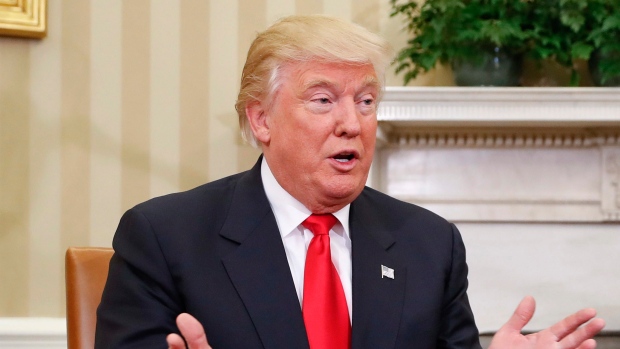Dec 5, 2016
Trump, oil could push TSX to record highs in 2017: RBC strategist
, BNN Bloomberg

The TSX could see double-digit gains in 2017 because of the Trump presidency and a positive outlook for the energy sector, according to Matthew Barasch, Canadian equity strategist at RBC Capital Markets.
In an interview with BNN Monday, Barasch said President-elect Donald Trump’s policy platforms will ultimately be positive for Canada.
“If you take the sum total of Donald’s Trump’s policy platform … we think the set up for Canada is pretty good,” he said, citing Trump’s liberal energy policy, tax cuts, infrastructure spending and fewer regulations.
“Our weighting in sectors that would be positively-exposed to this sort of thing is going to be greater than most other global developed markets,” he said. “In some ways — I hate to say it — this is something that works out pretty well for Canada.”
However, Barasch did note that Trump’s plan to slash the corporate tax rate in the U.S. to 15 per cent from 35 per cent could be a long-term worry for Canada, a country that has a lower corporate tax rate than the U.S. and Mexico.
“From a longer-term perspective, in our view, this is something that could be a concern for Canada,” he said, acknowledging that a lower corporate tax rate has been one Canada’s “competitive advantages.”
He added that the energy sector would be “the other big area” for growth in the coming year.
“We obviously got the OPEC announcement last week, and our commodity strategists are of the view that we could see $US60 oil by the end of next year.”
Barasch also said, however, from a relative performance perspective, investors should have a cautious approach for some sectors that have historically worked well.
“Certainly in the near term, the concern that you’re going to have as an investor is all that stuff that worked really, really well for the last six or seven years,” he said. “Here in Canada, those were the yield sectors, the utilities, the telcos, the REITs — consumer staples was certainly a place that investors did a lot of hiding in the last five or six years. From a relative performance perspective, we would expect that they may lag.”






